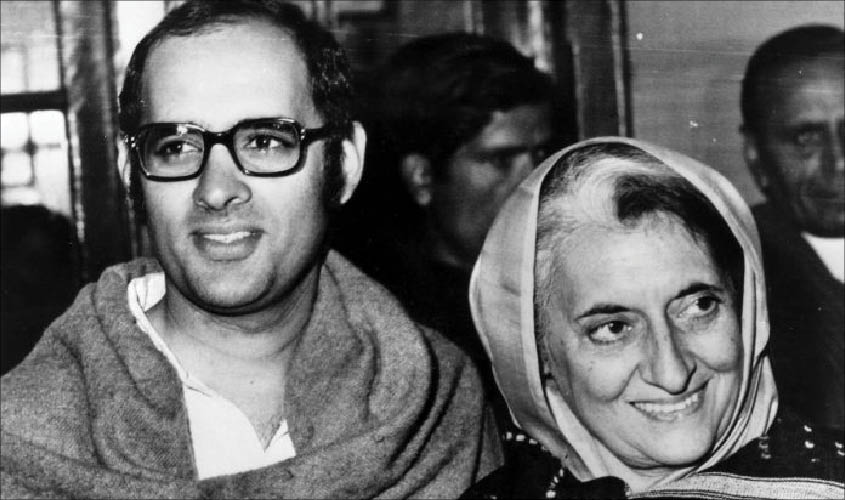Hearsay and gossip not the best tools of chronicling.
Two stories of the Emergency era have been going round in a section of the media in recent times. One speculates if Sanjay Gandhi at all knew that Indira Gandhi was going to call for elections on 18 January 1977. The other centres around a story first published in 1975 in Washington Post, which said that in the days prior to the Emergency Sanjay Gandhi had slapped his mother. The censorship of media made it next to impossible to authenticate the events between 26 June 1975, the day Emergency was imposed and 18 January 1977, the day it was partially lifted. Hearsay and gossip being applied as tools for chronicling those tumultuous days, therefore, is understandable.
Sanjay Gandhi’s shadow over the Indira regime was cast much before the Emergency. It began with the grant of licence to an unknown entity called Maruti Limited to produce the “people’s car” (somewhat a translation of German Volkswagen—a venture promoted in Germany in 1937 by Adolf Hitler). Top industrialists joined the venture as directors. Haryana Chief Minister Bansi Lal bent all rules to allot land in Gurgaon. There were dissenting voices—the all-powerful Union Minister S. Mohan Kumaramangalam sounded a word of caution to the Prime Minister and Opposition stalwarts Madhu Limaye and P. Ramamurti went hammer and tongs against the move on the floor of Parliament. A slogan raised by Jana Sangh camp in the 1972 state Assembly elections was “wah re Indira ki sarkar, bete ko di baby car”. Indira Gandhi stood by her son.
Sanjay made his formal entry in politics after imposition of the Emergency. Many chroniclers including the then Information Advisor to PM, the scholarly H.Y. Sharada Prasad, have referred to the “palace guard”. Some said PM Secretariat was the “water pumping station” while PM House became the “sewage board”. The role of Mrs Gandhi’s aide, R.K. Dhawan, in creating the “palace guard” has been often recorded. Kashmiri Pandits, who dominated the Nehru-Indira era till 1975, slowly withered, giving way to Dhawan’s friends. A lot of negative stories about Sanjay emanated from the jilted courtiers.
Sanjay’s dominance over Congress originated in December 1975—he was inducted into the Indian Youth Congress (IYC) National Council. Later that month he was the prima donna at the Komagatamaru Nagar (Chandigarh) session of AICC. Eleven months later, coinciding with Indira Gandhi’s 57th birthday, a session was held at Jawaharnagar (Guwahati), where Indira Gandhi told Youth Congress delegates “you’ve stolen the thunder”. In his speech Sanjay said that while at Chandigarh the youth meeting was a sideshow, in Guwahati, the AICC meeting was the sideshow of the youth meeting. “Youth Congress is no longer the tail; it will set the pace for the parent party”, he asserted. Both he and the IYC president, Ambika Soni, posed critical questions to the Congress president, D.K. Barooah on the state of the organisation. In its economic resolution, IYC asked for scaling down planning, promoting private enterprise and liberalising the licensing raj. In the presence of youth delegations from 41 countries, mostly aligned to the Soviet bloc, Sanjay Gandhi thanked the nations which stood by India at the UNO, but stressed that India needed to be friends with all. The clear departure from the AICC’s left stance at home and abroad was visible in the November 1976 Guwahati meet.
Eminent jurists and leading journalists have speculated post the posthumous release of a book by Kuldip Nayar if Sanjay was aware that elections will be announced. This writer was privy on the morning of 18 January 1977 that Emergency was being relaxed and polls scheduled, as he witnessed a flurry of activity in the IYC camp. On 16 January, D.K. Barooah had been summoned to PM House and briefed on the possibility of elections. Sanjay Gandhi asked the IYC leadership to prepare a list of 200 candidates who would be fielded from among the youth cadre. A la 1969, he was preparing for a parliamentary party, which will be loyal specifically to his leadership. The news of the list leaked out and led to the J-Bomb: the formation of the Congress For Democracy (CFD) by Jagjivan Ram, Hemvati Nandan Bahuguna, Nandini Satpathy inter alia on 2 February. This act of defiance by leading members of the Congress signalled that the dreadful Emergency was almost over and that Indira Gandhi could be challenged and defied. The role of CFD in creating the Janata wave has perhaps been understated by analysts. (Incidentally, an obituary to Kuldip Nayar mentions that on 18 January 1977 he had written in Indian Express about the possibility of polls—if Nayar was aware, could Sanjay have been in the dark?)
A speculative story filed by Pulitzer award winning scribe Lewis M. Simons, after he had left India on being expelled during the Emergency, that he had heard during a dinner pre-Emergency that Sanjay had slapped his mother has also created ripples. In an interview to David Frost of BBC in 1977, Mrs Gandhi was asked about this. She replied: “If so, it’s what my father would say, ‘fantastic nonsense’. I’ve not been slapped by anybody, so far and he (Sanjay) has not slapped anybody.” Simons says that when he returned to India post-Emergency, he met Rajiv Gandhi and Sonia at a dinner when someone pointed out that he was the author of the slapping story—Rajiv smiled and Sonia looked furious. The perhaps polite refusal of the couple to enter into an argument at a host’s dinner table was taken as an answer in affirmation by the US journalist.
Speculation that Nitin Gadkari is being “groomed” to replace Narendra Modi—fervently denied by the former—needs to be perhaps treated as being in the realm of hearsay and gossip, which is stalking the Emergency era events in a section of the media.

